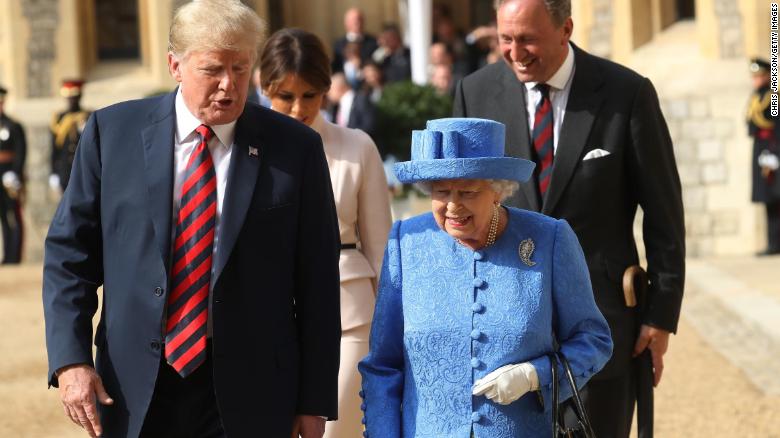Britain braces as Donald Trump marches into political mayhem

Theresa May last week became the second British prime minister to fall victim to Brexit. The governing Conservative party is engaged in a myopic fight over who will replace her. Voters are sick of the mess and are flocking to political movements on the extreme ends of the Brexit debate. Ordinarily, a state visit from the sitting US President is a chance for the UK so show off to the world the “special relationship” it enjoys with America and Britain at its best. But the best outcome for the Trump state visit is that it passes with as little fuss as possible. The chances of that seem slim. Earlier this week, Donald Trump said that Boris Johnson, the current frontrunner to replace May, was a “friend” for whom he had “a lot of respect.” He said the same thing of the hard Brexiteer and Conservative Party nemesis, Nigel Farage. Trump even hinted that he might meet the pair while he’s in London.Officials would rather he didn’t, and there’s nothing on the official schedule so far. And while Farage would thrive from the attention, it’s not at all clear that Johnson would benefit from a presidential one-on-one.Under normal circumstances, someone hoping to be the next leader of a country would bite the hand off a US President offering an endorsement. But these are not normal circumstances and Donald Trump is not a normal President.Johnson is often described as a British Trump. Both men have a history of saying controversial and sometimes offensive things in public (Johnson famously wrote a newspaper column last year saying that women wearing full Islamic face veils looked like letter boxes). Both have been accused of lying during political campaigns (something for which Johnson now faces a court hearing). And both have absolutely epic hairstyles.However, the comparisons only work at this superficial level. Comparing Johnson’s politics to Trump’s populism is at best disingenuous and at worst a smear. The thing is, it’s a smear that works.Trump is not popular in the UK. Most Brits regard his style of politics as crass. His public comments about women and Muslims don’t go down well. There is a sense of British fair play that tends to extend to the level of decency expected by those elected to power. This is especially true of Conservative party members. Think people drinking warm beer and watching cricket, not screaming “lock her up” at rallies.Tim Bale, professor of politics at Queen Mary, University of London sums it up: “I think people in the US don’t appreciate that Donald Trump is seen on all sides of British politics as a figure of fun and not someone to take too seriously. Any endorsement by him isn’t likely to do a candidate any good — and might do them some damage.”The problem for Johnson is that, in calling him a “friend”, Trump has already given him something of an endorsement. It’s unlikely that Johnson feels the same. In 2015, when Johnson was mayor of London, Trump said that some areas of the British capital with large Muslim populations had become so radicalized “that police are afraid for their own lives.” Johnson’s riposte was that he wouldn’t visit some parts of New York for the “real risk of meeting Donald Trump.” For Farage, the Trump connection plays differently. His newly-formed Brexit Party finished in first place at last week’s European elections. Broadly speaking, Farage’s base is far more sympathetic to Trumpian politics than Johnson’s. An endorsement from Trump could help Farage lock down that harder-line voter at a crucial moment in British politics. And Farage has the luxury of not needing to look outside of that pool of voters.Unlike Farage, Johnson has to appeal to a far broader church if he is to succeed as leader. Many Conservatives voted to remain in the EU and remain ardently pro-European. As recently as October, liberal Conservatives grimaced at the idea of Johnson becoming prime minister. Today, many of them see him as their only option if they are to avoid electoral oblivion.The success of the Brexit Party has spooked Conservatives. The longer Brexit remains unresolved, the more vulnerable they are. On Friday, the polling company YouGov published a survey of voters’ general election intentions which placed both the governing Conservatives and opposition Labour behind the second-placed Brexit Party.Brexit, as if anyone needed reminding, is the single most divisive issue in Britain today. Ahead of the Brexit Party in the YouGov survey were the Liberal Democrats, a party that campaigned in last week’s European elections using the slogan “Bollocks to Brexit.”The UK’s traditional two-party system has held for a long time, but it is creaking. Brexit has devastated the traditional dividing lines and rewritten the rules of politics. Neither of the main parties has even begun to work out how to address this new challenge.And into this mayhem marches a US President with a proven track record of being wildly unhelpful to the British government. On his last visit, his opening gambit was to give an interview to the Sun newspaper in which he trashed Theresa May’s handling of Brexit.Last year, he publicly stated that the deal she had struck with the EU would prohibit the UK from being able to trade with the US.Whether or not the President will meet with either Johnson or Farage is getting a lot of attention. As things stand, people working on the details of the trip do not officially expect either meeting to happen. But this is a president who marches to the beat of his own drum and loves attention — good or bad.It probably hasn’t occurred to him that others would prefer that he kept his mouth shut.






